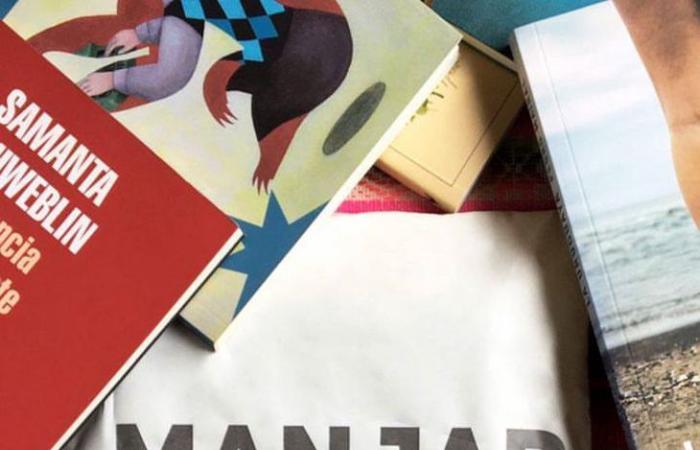Text co-authored by Germán Soranno and Alejandro Nabhen Pirles, curators of MANJAR (@manjarliterario)
Several decades ago since the book circulation of any theme is organized mainly by a single vector: the novelty market. The publicity that this entails in the media, the advantage that this also represents compared to the algorithms of social networks and the exhibition in bookstores They are setting the pulse of the production of books many years ago. Being a publisher, it is not difficult to deduce that the more new products your catalog has, the greater the diffusion, and the greater the diffusion, the greater the sales. Without a doubt, any professional approach to editing must take this aspect into account. Does this necessarily have to be like this? According to our perspective, today yes, although probably not in the future.
Since its appearance, the media They scaled quickly, and in a few years they became truly massive platforms. They captured the public’s attention based on the periodic publication of news and exploited this resource really well. It would not be difficult to think that since novelty is the raw material of this industry, its consumers do not look for anything else. For this reason, any promotion attempted from this platform, It must necessarily include some novel component and be consistent with the reason for being of this support and thus achieve relevance in communication. Having been the media the only major dissemination platform for many years, and dissemination being very necessary to sustain any editorial project, it is almost mathematical to conclude that the more novel a publication is, the greater the chance of reaching the media, and that the greater amount of sales it represents.
But there is something else, the centrality of the media was so omnipresent that the last generations of us became so addicted to novelty that it became inseparable from our lifestyle. We spend a lot of our energy visiting news portals several times in the same day, we automatically check our cell phones for new notifications or we scroll through social networks to find out what the people we follow have new things to say. It is still mathematical to reason that the more novel it is, the more attention it receives.
On the other hand, anyone who has worked in a bookshop knows how necessary it is to renew the display frequently to capture the attention of recurring customers or neighbors who always pass by and take some time to look at the windows. The bulky packages that arrive with books monthly can be a nuisance for deposits and a cause of grumbling for bookseller employees, but they are an indispensable part of the operation of this system.
image.png
Social networks are increasingly predominant in the exchange of information, and do not necessarily have the same logic as the media. However, they are still a living reflection of the behavior of society and, although much more sophisticated, algorithms continue to exploit the same resource. To capture attention, they demand new posts, new stories, new products.
It happens that something is changing and, although incipient, it is doing so very rapidly. However, because it is a trend that has just begun, it may not be visible to everyone. An increasingly important portion of society has begun to sanction the addiction to novelty as artificial and pathological and little by little, They are organizing alternative and increasingly decentralized modes of consumption. It is about overcoming the addictive and unnatural behavior of feeling drawn to what is new, with a more authentic behavior that places more value on discovering and not so much on finding out.
The book industry It is very representative in this aspect. Publishers need to flood bookstores with new products to have their share in the rotating exhibition mainly in shop windows and news portals. More than responsible, the publishers seem to be victims of this system and end up nothing more than self-cannibalizing their own catalog. The result is an anxious production where very good books do not have the exhibition time they need, and are quickly displaced, causing the frustration of authors, editors and the confusion of potential readers. The new is prioritized over the good and the urgent over the necessary. Taking this panorama into account, it seems imperative to organize the choice of readings with a healthier, fairer and more authentic criterion. As book curators at MANJAR, recommendation as a new organizing vector and enthusiasm as the fuel of communication and press makes a lot of sense to us. Transmitting fascination for something is a very rewarding task and receiving that enthusiasm is a very powerful and healthily contagious stimulus.
image.png

We understand that the literary subscriptions (especially those of us who do not focus on news) are still an alternative commercial device, and possibly uncomfortable for some sectors of the sector. However, it seems very logical that the consumption of books is needing to reorganize and it is very natural that he is starting to do it this way. In no way is it a fashion, but rather an intrinsic self-regulation according to the existing situational state, which places readers in a better position, does justice to many books and writers, in addition to rewarding and giving respite to the great work and investment that publishers make.
To the extent that we overcome resistance, which is nothing more than accepting that the literary canon that they went down universities or authority figures and the exhibitionist strut of the novelty market are only vertical suggestions, and therefore omnipresent, that far from being denied, need to be contrasted in a harmonious coexistence, giving more importance to the fervent recommendation or allowing oneself to be seduced by the insinuation. passionate from some other enthusiastic reader.
Once the publishing scene truly integrates the reception experience into the commercial circuit, it will be a relief from market anxiety and will take artistic pressure off of literary production. In this way, we will have better booksand happier editors, readers, curators, writers and booksellers.








